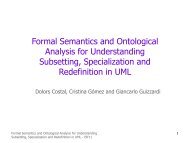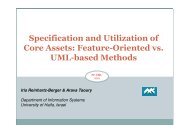booklet - ER 2011
booklet - ER 2011
booklet - ER 2011
Create successful ePaper yourself
Turn your PDF publications into a flip-book with our unique Google optimized e-Paper software.
Tutorial Abstracts<br />
Towards a theory of search queries<br />
Jan Van den Bussche (Hasselt University, Belgium)<br />
Date: Monday 14:00-15:30<br />
Room: Louise 3b<br />
Tutorial Abstracts<br />
Jan Van den Bussche is a professor of databases and theoretical computer science at Hasselt<br />
University, Belgium. His research is on the theory of database systems, broadly construed, and<br />
he has recently published on topics as diverse as workflow provenance and DNA computing. He<br />
has been the recipient of two PODS best paper awards. He obtained his PhD from the University<br />
of Antwerp in 1993, under the supervision of Jan Paredaens. He has served as PC chair for the<br />
International Conference on Database Theory (ICDT) in 2001 and the ACM Symposium on Principles of<br />
Database Systems in 2006, and has served from 2001 until <strong>2011</strong> as chair of the ICDT council. He currently<br />
serves on the editorial boards of Information Systems, ACM Transactions on Database Theory, and Fundamenta<br />
Informaticae.<br />
Abstract Current information systems, such as file systems, library catalogues, websites, Semantic Web<br />
search, dataspaces, Google Fusion Tables, offer search capabilities that are typically weaker that the standard<br />
”first-order” SQL query capabilities expected of a fully-fledged database system. The theory of databases has<br />
explored first-order queries (relational algebra, relational calculus) extensively, but a theory of weaker, searchlike<br />
query mechanisms is only at its beginnings. In this tutorial we present our first steps in this direction,<br />
based on an article we published with Fletcher, Van Gucht, and Vansummeren, in ACM TODS in 2010. We<br />
will begin by recalling some basics of the theory of database queries, so that everyone can follow the tutorial.<br />
Patterns of Data Modeling<br />
Michael Blaha (Modelsoft Consulting Corp, USA)<br />
Date: Tuesday 14:00-15:30<br />
Room: Louise 3b<br />
Michael Blaha has been a consultant and trainer in conceiving, architecting, modeling, designing,<br />
and tuning databases since 1994. He has worked with dozens of organizations throughout the world.<br />
Blaha has authored six books, six US patents, and many papers. His most recent book is ”Patterns<br />
of Data Modeling”. He was an editor of IEEE Computer from 2000-2007 and was a member of<br />
the IEEE-CS Publications Board from 2004-2007. Blaha received his doctorate from Washington<br />
University in St. Louis and is an alumnus of GE Global Research.<br />
Abstract Data modeling is one of the most difficult tasks for software development. The difficulty lies with<br />
the need to reach beyond the literal problem by abstracting and capturing a problem’s essence. Patterns<br />
promote abstraction by illustrating the options and trade-offs in alternative data model representations. Most<br />
of the data patterns literature focuses on seed models. In contrast, this tutorial emphasizes true abstract<br />
patterns that are apart from a problem domain. There are multiple aspects of pattern technology including<br />
mathematical templates, antipatterns, archetypes, identity, and canonical models.<br />
This tutorial quickly covers the breadth of patterns and then goes into depth on selected topics. We present<br />
six ways for modeling trees (a mathematical template) along with examples and trade-offs. We also present<br />
several antipatterns and show how they apply when reverse engineering the LDAP standard to recover its<br />
underlying conceptual data model.<br />
37




